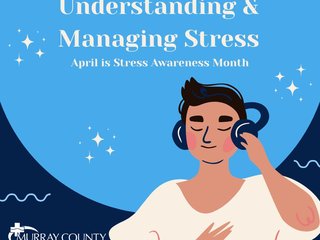Blog
April is Stress Awareness Month: Understanding and Managing Stress

Stress is a part of everyday life, but how we handle it can make a significant difference in our overall well-being.
April is Stress Awareness Month, a time dedicated to recognizing the impact of stress, understanding how it affects us, and learning ways to manage it effectively.
In recent years, conversations about mental health and stress management have become more common- which is a great step forward! While everyone experiences stress differently, one thing is certain: chronic stress can take a serious toll on both our mental and physical health.
How does stress affect you?
Stress doesn’t just impact your mood- it can affect every aspect of your life including:
- Your ability to think clearly and concentrate on daily tasks
- Your mental health and emotional well-being
- Your physical health, which can lead to:
- Headaches
- Aches and Pains
- Worsening of existing health conditions
- Your sleep quality
- Your energy levels and overall interests
- Your appetite and eating habits
- Your mood and interactions with others
Managing Stress: What can you do?
Since stress affects everyone differently, it’s important to find coping strategies that work best for you. Here are some techniques or ideas to help you manage stress.
- Take Time to Unwind - Set Aside moments in your day for relaxation, whether that’s reading, listening to music, or engaging in a favorite hobby.
- Practice Mindfulness and Deep Breathing - Techniques like meditation and focused breathing can promote relaxation and help you manage stress in the moment.
- Try Journaling - Writing down your thoughts can help you process emotions and reduce mental clutter.
- Prioritize Sleep - Quality sleep is essential for both mental and physical health. To improve your sleep: Create a restful sleep environment, limit screen time before bed, and aim for at least 7 hours of sleep per night.
- Move Your Body - Exercise isn’t just for physical health, it plays a major role in managing stress and boosting one's mood. Try to maintain a consistent workout routine. If you’re new to exercise, start small with short walks or light stretching. By adding physical movement into one’s day, it can help clear your mind and improve focus.
- Connect with Supportive People - Talking to someone you trust- whether it’s a close friend, family member, or mentor- can help provide relief during stressful times.
- Set Healthy Boundaries with News and Social Media - Constant exposure to negative news and online stressors can increase anxiety. If you’re feeling overwhelmed, take breaks from screens and unplug when needed.
- Seek Professional Help When Needed - If stress feels overwhelming despite your best efforts, don’t hesitate to reach out to a professional. A primary care provider or therapist can help you explore personalized strategies, lifestyle changes, or treatment options that work best for you.
Stress is a natural part of life, but it doesn’t have to control your well-being. By recognizing its impact and taking proactive steps to manage it, you can improve your quality of life and build resilience against life’s challenges.
Take care of yourself!
Posted by:
-
 Briana Solheim
Briana Solheim